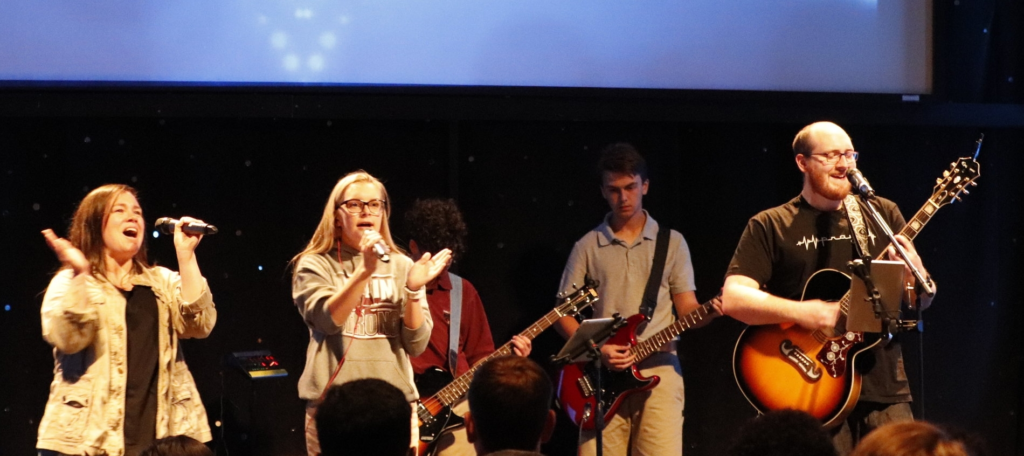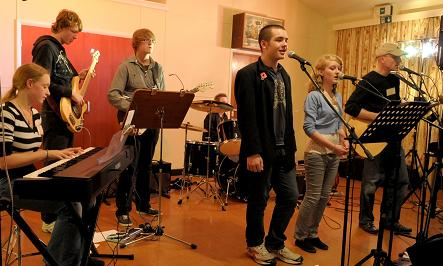In recent years, modern worship bands have taken the spotlight in churches across the globe. They are reshaping how congregations connect with their faith through music. Gone are the days of solely traditional hymns; today’s praise music is a dynamic blend of styles and sounds that resonates with diverse audiences. As these bands redefine praise music, they bridge generational gaps and invite everyone into a vibrant worship experience.

Introduction to Modern Worship Bands
With contemporary elements woven into their performances, modern worship bands challenge conventional notions of what church music can be. Whether it’s incorporating pop influences or experimenting with electronic sounds, they’re pushing boundaries and creating an atmosphere where faith and creativity intertwine seamlessly. Join us as we explore how these innovative groups are transforming worship culture one note at a time.
The Evolution of Praise Music
Praise music has a rich history that reflects the changing cultural landscape. From hymns sung in quaint chapels to grand orchestral arrangements, each era introduced new sounds and styles.
The 20th century saw a significant shift with the emergence of gospel music. Artists like Mahalia Jackson brought emotional depth and spiritual fervor to worship settings, captivating audiences across America.
As time progressed, folk influences began weaving into church services during the ’60s and ’70s. This led to the birth of contemporary Christian music, making faith accessible through relatable lyrics and acoustic melodies.
Today’s modern worship bands continue this evolution by infusing elements from pop, rock, and electronic genres. The result is vibrant praise music that resonates deeply with diverse congregations while remaining rooted in tradition. Each note played serves as a bridge between generations, reflecting both personal experiences and collective beliefs within worship communities everywhere.
Incorporating Contemporary Elements in Worship Music
Modern worship bands are transforming traditional praise music by blending contemporary elements into their sound. This shift is evident in the use of electric guitars, synthesizers, and percussion alongside classic instruments like pianos and acoustic guitars.
Lyrics have also evolved, often reflecting personal experiences and struggles. Instead of solely focusing on biblical narratives, many modern praise songs capture the essence of everyday life and faith journeys.
Collaborations with diverse genres such as pop, rock, and even hip-hop enrich worship music further. These influences create a vibrant atmosphere that resonates with younger audiences who crave authenticity in their spiritual expression.
The arrangement of songs has changed too. Extended musical interludes allow for improvisation during live performances. This gives congregations space to engage deeply through spontaneous worship moments.
By embracing these contemporary aspects, modern worship bands foster an inclusive environment where everyone feels connected to the divine message being shared.

The Impact of Technology on Modern Worship Bands
Technology has transformed how Modern Worship Bands create and perform music. Digital tools have become essential for songwriting, allowing artists to experiment with various sounds and styles effortlessly.
Recording software makes it easy to produce high-quality tracks at home. This accessibility democratizes music creation, inviting a wider array of voices into the contemporary worship scene.
Moreover, social media platforms enable bands to share their work instantly. Artists can connect with followers in real-time, fostering community beyond church walls.
Live streaming services allow congregations worldwide to experience worship together, regardless of location. This shift not only expands reach but also enriches the worship experience by incorporating diverse perspectives.
Visual elements like lighting and projection are now integral parts of modern praise settings. These innovations enhance emotional engagement during performances, making worship more immersive than ever before.
Criticism and Controversies Surrounding Modern Worship Bands
Modern worship bands often face criticism for their approach to praise music. Detractors argue that blending contemporary styles with traditional hymns dilutes the sacredness of worship. Some believe that electric guitars and drum kits overshadow spiritual connection.
There are concerns about commercialization as well. Critics point out that some modern praise music seems more like a product than an expression of faith. This raises questions about authenticity in worship.
Additionally, the use of elaborate stage setups can lead to debates over whether performance takes precedence over genuine worship experiences. For many, this shift feels disconcerting.
Yet, these controversies spark important conversations within congregations and communities. They encourage believers to reflect on what truly constitutes meaningful worship in today’s world and how it aligns with personal beliefs and values.

Examples of Successful Modern Worship Bands
Hillsong United stands at the forefront of modern worship bands. Their dynamic sound and heartfelt lyrics have captivated audiences worldwide. Songs like “Oceans” and “What a Beautiful Name” resonate deeply with congregations, making them staples in contemporary worship.
Bethel Music is another influential group, known for their immersive worship experiences. They blend powerful vocals with atmospheric instrumentals, creating an environment conducive to spiritual connection. Tracks such as “Reckless Love” showcase their unique approach to praise music.
Elevation Worship also makes waves by merging energetic performances with profound theological messages. Their anthems often feature catchy hooks that invite participation from the congregation.
Passion City Church’s band has redefined how young people engage with faith through music. With a focus on authenticity and relevance, they inspire many across various platforms while remaining rooted in traditional praise themes.

Conclusion: The Future of Praise Music and the Role of Modern Worship Bands
The landscape of praise music is changing rapidly. Modern worship bands are at the forefront of this transformation, blending traditional faith with contemporary styles and sounds. They have harnessed the power of technology and innovation to create an engaging worship experience that resonates with today’s audience.
As we move forward, it’s clear that modern worship bands will continue to shape the future of praise music. Their ability to connect with congregations through new praise music trends ensures that faith remains relevant in a fast-paced world. This evolution encourages diverse worship music styles, appealing to a wide range of listeners.
Critics may raise concerns about the commercialization or authenticity of these innovations, but many argue that reaching people where they are—both musically and spiritually—is crucial for growth within communities. The dialogue surrounding modern praise bands might be contentious at times, but it fosters deeper discussions about what worship means today.
With each note played and each lyric sung, modern worship bands offer a fresh perspective on faith-based expression. Whether through uplifting melodies or thought-provoking lyrics, they invite individuals into meaningful encounters with spirituality.
Looking ahead, as technologies evolve further and cultural dynamics shift even more dramatically, one can anticipate exciting developments in contemporary Christian music. The journey continues as artists strive to redefine how we engage with our beliefs through sound—a testament not just to tradition but also to innovation in faith-led expressions across generations.
Stay tuned for more updates only on QAWire
